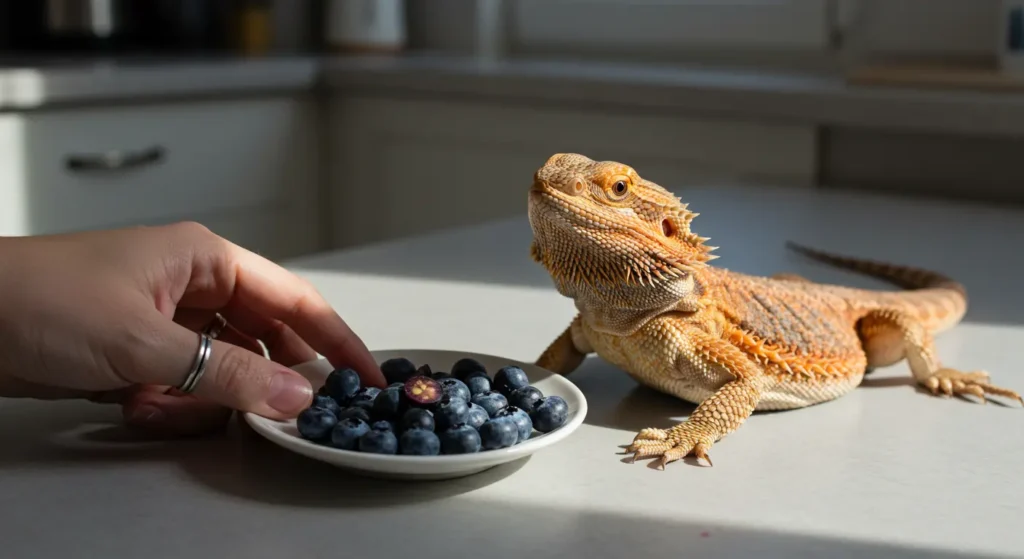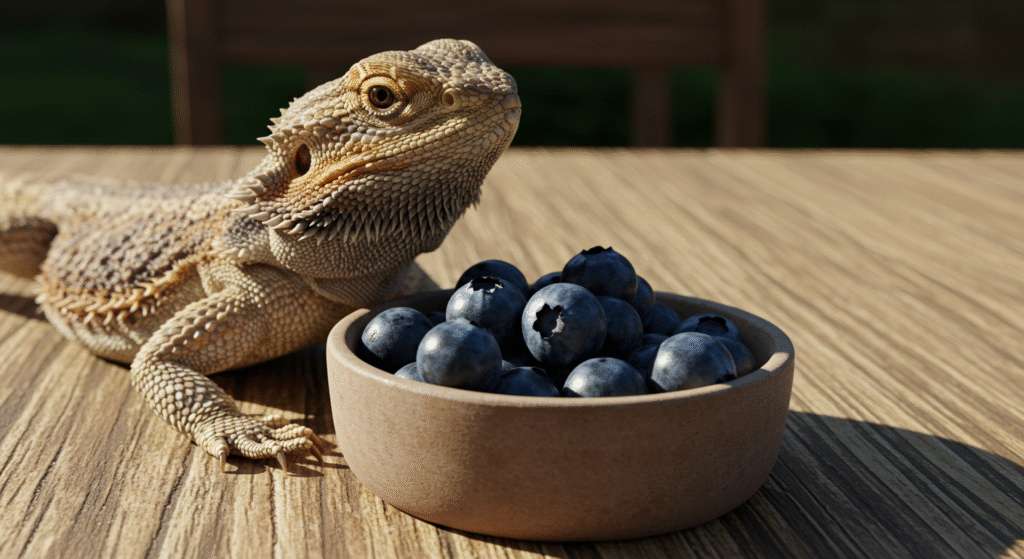Bearded dragons are curious and often eager to try new foods, which makes many owners wonder: Can Bearded Dragons Eat Blueberries? Understanding whether these small, sweet fruits are safe is essential for maintaining a balanced and healthy diet for your pet. While blueberries offer vitamins, antioxidants, and fiber, it’s important to know the correct serving size, frequency, and preparation to avoid potential health risks.
In this guide, we will answer the question, Can Bearded Dragons Eat Blueberries?, in detail, exploring raw versus frozen options, portion control, and how blueberries fit into a balanced diet alongside other fruits, vegetables, and protein sources. By the end, you’ll have a clear understanding of how to safely include blueberries as a tasty treat while keeping your bearded dragon healthy and thriving.
Can Bearded Dragons Eat Blueberries? Everything You Need to Know
Bearded dragons are curious eaters, and it’s common for owners to wonder if human foods like blueberries are safe for them. These small, juicy fruits are often considered healthy for humans, but reptiles have very different dietary needs. Understanding the safety, frequency, and portion size of blueberries can help you include them responsibly in your dragon’s diet.
Can bearded dragons eat blueberries raw safely?
Yes, bearded dragons can eat blueberries raw, and in fact, raw is the preferred form. Raw blueberries retain their natural vitamins, antioxidants, and fiber, which can offer a small nutritional boost to your pet. Cooking blueberries can break down some of these nutrients, reducing their overall value. However, raw blueberries also contain natural sugars and oxalates. While small amounts are generally safe, excessive sugar can upset digestion and may contribute to obesity over time. Oxalates are compounds that bind to calcium and can interfere with absorption, so feeding too many blueberries can impact bone health if not balanced with calcium-rich foods. Always wash blueberries thoroughly to remove pesticides or contaminants and cut them into small, manageable pieces to prevent choking. Offering raw blueberries occasionally allows your beardie to enjoy a sweet treat safely without compromising their health.
Can bearded dragons eat blueberries everyday without health risks?
Feeding blueberries every day is not recommended for bearded dragons. Although blueberries are nutritious, they contain natural sugars and phosphorus, which can disrupt the delicate balance of calcium and phosphorus in a beardie’s diet. Too much sugar may lead to digestive upset, obesity, or even long-term health issues like Metabolic Bone Disease (MBD). Bearded dragons thrive on a diet primarily consisting of leafy greens, vegetables, and insects, with fruits like blueberries considered occasional treats. Daily feeding of blueberries can overwhelm their digestive system, potentially causing soft stools, bloating, or lethargy. Instead, limit blueberry servings to a few times per week or as an occasional snack. Rotating fruits and treats ensures your beardie receives a balanced diet and minimizes the risk of sugar-related or nutrient-related problems. Moderation is key to safely incorporating fruits into your reptile’s lifestyle.
How many blueberries can be safely fed to bearded dragons?
Portion control is critical when feeding blueberries to bearded dragons. For small or juvenile dragons, offering half a blueberry is sufficient for a single serving. Adult dragons can handle one to two small blueberries, depending on their size. Overfeeding even healthy fruits can lead to digestive discomfort or nutrient imbalances. Remember, the calcium-to-phosphorus ratio in blueberries is not ideal, so excessive consumption may interfere with calcium absorption and bone health. Always introduce blueberries gradually and monitor your dragon’s response. Signs such as loose stools or decreased appetite indicate that the portion may be too large. Serving blueberries as tiny pieces mixed with other safe fruits or greens can make it easier for your beardie to enjoy the treat without overconsumption. Careful portioning ensures that blueberries remain a safe and enjoyable addition to their diet.
Are blueberries a safe treat for baby bearded dragons?
Baby bearded dragons require a diet focused on protein and calcium to support rapid growth, so fruits like blueberries should be offered sparingly. Occasional tiny pieces of blueberries—perhaps once every few weeks—can be introduced as a treat, but the majority of their diet should consist of insects, leafy greens, and calcium-rich vegetables. Too many fruits at this stage may displace the essential nutrients they need to develop strong bones and a healthy metabolism. Additionally, young dragons have smaller digestive tracts, making them more sensitive to natural sugars and oxalates present in blueberries. Always cut the fruit into very small, manageable pieces to prevent choking and monitor their reaction carefully. Treating blueberries as an infrequent snack ensures baby beardies benefit from variety without compromising growth or health.
Blueberries Nutrition for Bearded Dragons: Benefits and Risks
Blueberries are often seen as a superfood for humans, but how do they impact bearded dragons? While small amounts can provide beneficial nutrients, there are also risks to consider. Understanding the nutritional profile of blueberries helps ensure your dragon enjoys them safely.
Vitamins and antioxidants in blueberries for beardie health
Blueberries are rich in essential vitamins and antioxidants that can provide small boosts to your bearded dragon’s health. Key nutrients include vitamin C, which supports the immune system, and vitamin K, which plays a role in blood clotting and overall health. They also contain fiber, which can aid digestion, and a range of antioxidants that may help reduce cellular stress. For bearded dragons, these nutrients are not strictly necessary in large amounts but can serve as supplemental support when offered as an occasional treat. It’s important to remember that blueberries should never replace staple foods such as leafy greens and insects. Using blueberries strategically can enhance dietary variety and provide some health benefits without compromising the balance of essential nutrients.
Natural sugars, oxalates, and potential digestive issues
Despite their nutritional benefits, blueberries contain natural sugars and oxalates that can pose challenges for bearded dragons. Excess sugar can disrupt the digestive system, leading to soft stools, bloating, or decreased appetite. Oxalates, on the other hand, bind to calcium and can reduce its absorption, potentially impacting bone strength over time. Because calcium is critical for preventing conditions like Metabolic Bone Disease (MBD), it’s important to offer blueberries in moderation. Small, occasional servings mixed with calcium-rich vegetables or dusted insects help mitigate these risks. Observing your dragon’s reaction to new foods and adjusting serving size ensures that blueberries remain a safe, enjoyable, and low-risk treat.
Calcium vs phosphorus ratio and Metabolic Bone Disease (MBD) risk
Blueberries have a higher phosphorus content relative to calcium, which can affect your dragon’s calcium balance if consumed too frequently. This imbalance can increase the risk of Metabolic Bone Disease (MBD), a serious condition that weakens bones and may lead to deformities. To reduce this risk, always serve blueberries alongside calcium-rich vegetables or supplements. Remember, treats like blueberries should make up only a small portion of the diet. By monitoring calcium-phosphorus ratios and maintaining a diet with a strong emphasis on greens and insects, you protect your bearded dragon’s skeletal health while still allowing them to enjoy occasional fruity treats safely.
Hydration and fiber: supporting digestion and overall health
Blueberries have a high water content, which can help with hydration, especially in bearded dragons that may not drink enough from their water dish. The fiber in blueberries also aids digestion, promoting healthy stool formation and regular bowel movements. However, fiber alone cannot replace other essential dietary components. Combining blueberries with leafy greens and protein sources ensures your dragon receives a balanced diet while enjoying the occasional hydrating snack. Offering blueberries in small portions can provide these hydration and digestive benefits without overwhelming your dragon’s system.
How to Feed Blueberries to Bearded Dragons Correctly
Feeding blueberries safely requires attention to preparation, portion size, and frequency. Correct handling ensures your bearded dragon enjoys the treat without digestive or health issues.
Preparing blueberries: washing, cutting, and removing stems
Proper preparation is crucial for safety. Always wash blueberries thoroughly to remove pesticides, dirt, or chemical residues that could harm your dragon. Cutting the berries in half or smaller pieces helps prevent choking, especially for smaller dragons. Removing stems is also recommended, as they can be difficult to digest and may cause gastrointestinal discomfort. Well-prepared blueberries reduce the risk of digestive issues and make it easier for your dragon to enjoy the fruit safely.
Proper serving sizes for adult and juvenile bearded dragons
Serving size depends on age and size. Juvenile dragons should only receive tiny pieces occasionally, as their diet should focus on protein and calcium-rich vegetables. Adult dragons can handle slightly larger portions, such as one to two small blueberries per serving. Overfeeding can lead to digestive upset, sugar-related issues, and nutrient imbalance. Always monitor your dragon’s reaction and adjust portions accordingly to maintain a healthy diet.
Can bearded dragons eat frozen blueberries?
Frozen blueberries are generally safe if thawed completely before feeding. Thawing preserves the fruit’s nutrients and texture, making it easier for your dragon to digest. Avoid feeding frozen fruit directly from the freezer, as the cold temperature may shock the digestive system. Plain, unsweetened frozen blueberries are best; any added sugar or syrup can harm your pet. Thawed blueberries provide a convenient, safe way to offer this occasional treat.
Can bearded dragons eat frozen or dried blueberries safely?
While thawed frozen blueberries are safe, dried blueberries are not recommended. Dried fruits have concentrated sugar levels and may contain preservatives that are harmful to reptiles. They also pose a higher risk of digestive issues and potential obesity if fed regularly. Fresh or thawed frozen blueberries remain the safest options for an occasional, healthy treat.
Feeding frequency: occasional treats vs regular diet
Blueberries should be offered as an occasional treat, ideally once or twice per week. Daily feeding is not recommended due to sugar and phosphorus content. Focus the majority of your dragon’s diet on vegetables, greens, and insects, reserving fruits like blueberries for variety and enrichment. Occasional servings ensure your bearded dragon enjoys a flavorful snack without compromising overall nutrition.
Safe Fruit Alternatives for Bearded Dragons
While blueberries can be a safe occasional treat, it’s helpful to know other fruits that your bearded dragon can enjoy safely. Providing a variety of fruits adds interest and enrichment to their diet, but moderation is always key. Balanced alternatives ensure nutritional benefits without overloading your dragon with sugar or harmful compounds.
Can bearded dragons eat blackberries and other berries?
Yes, blackberries and similar berries can be offered as occasional treats, much like blueberries. Blackberries are low in calories and rich in vitamins, antioxidants, and fiber, which support digestion and overall health. However, they also contain natural sugars and phosphorus, so they should be fed sparingly. Rinse blackberries thoroughly to remove pesticides, and cut larger berries into small pieces to prevent choking. Other safe berry options include raspberries and blueberries, which provide similar nutritional benefits. Remember that berries should not replace staple foods like leafy greens and insects, but they can add variety and enrichment. Rotating different safe fruits in small portions keeps your bearded dragon interested in feeding and introduces gentle nutritional diversity.

Safe fruits like strawberries, mango, and papaya for beardies
In addition to berries, other fruits like strawberries, mango, and papaya can be offered occasionally. These fruits are nutrient-dense, providing vitamins A, C, and fiber, which support immune function and digestive health. Like berries, they should be served in small, manageable portions to prevent overfeeding and sugar-related issues. Cut the fruits into bite-sized pieces and remove seeds or tough parts that may be difficult to digest. Papaya is particularly good because it contains digestive enzymes that can aid in nutrient absorption. These fruits are excellent for adding variety and color to the diet while still adhering to the principle of moderation. Consistently prioritizing staple foods over fruits ensures your bearded dragon maintains proper growth and skeletal health.
Leafy greens and vegetables to include daily
Leafy greens and vegetables form the core of a healthy bearded dragon diet and should be offered daily. Collard greens, mustard greens, dandelion leaves, and turnip greens are excellent sources of calcium and fiber. Vegetables like bell peppers, squash, and carrots provide additional vitamins and minerals without excessive sugar. Leafy greens help maintain proper calcium-phosphorus balance, reducing the risk of Metabolic Bone Disease (MBD). Mixing a variety of vegetables ensures your dragon receives a broad spectrum of nutrients. Always wash vegetables thoroughly and chop them into appropriate sizes for your dragon to prevent choking. Prioritizing greens over fruits and maintaining variety will support overall health, growth, and long-term vitality.
Protein sources: insects such as crickets, dubia roaches, and hornworms
Protein is essential for bearded dragons, particularly for juveniles who need it for growth. High-quality insects such as crickets, dubia roaches, and hornworms provide protein, fat, and other nutrients critical to development. Dusting insects with calcium or vitamin supplements helps maintain healthy bones and prevents nutrient deficiencies. Avoid feeding wild-caught insects, which may carry pesticides or parasites. Adult dragons require fewer insects than juveniles but still need them as a staple part of their diet. Protein should always remain the foundation of their feeding regimen, with fruits and vegetables as complementary components. Offering a diverse mix of insects ensures proper nutrition and keeps feeding time engaging and stimulating for your dragon.
Monitoring Health and Maintaining a Balanced Diet
Maintaining a balanced diet is essential for your bearded dragon’s long-term health. Observing their eating habits, digestion, and overall behavior helps ensure they are thriving while enjoying occasional treats safely.
Signs of overfeeding blueberries or sugar-related problems
Overfeeding fruits like blueberries can lead to digestive upset and sugar-related issues. Common signs include soft or runny stools, bloating, reduced appetite, lethargy, and occasional weight gain. Persistent issues may indicate a more serious imbalance affecting calcium absorption and bone health. If you notice these symptoms, immediately reduce fruit intake and focus on providing staple greens and insects. Monitoring your dragon’s response to new foods ensures that treats are safe and enjoyable. Moderation is key, and recognizing the signs of overfeeding early can prevent long-term health problems.
When to avoid blueberries for health reasons
There are specific situations when blueberries should be avoided altogether. Avoid offering blueberries if your dragon has digestive problems, is recovering from Metabolic Bone Disease, is overweight, or is still a very young juvenile requiring primarily protein-rich foods. In these cases, introducing sugary fruits can interfere with recovery, calcium absorption, and proper growth. Even healthy fruits like blueberries can exacerbate certain health conditions if given inappropriately. Prioritizing core dietary needs over treats ensures your dragon’s long-term well-being and prevents potential complications.
Keeping a feeding log for consistent and safe nutrition
Maintaining a feeding log helps track treats, vegetables, and insects offered each week. This practice ensures a consistent diet and prevents accidental overfeeding of fruits like blueberries. Recording portion sizes, frequency, and observed reactions allows you to adjust the diet as needed. A feeding log is particularly useful for monitoring juveniles or dragons with specific dietary needs, helping maintain a balanced intake of calcium, protein, and vitamins. This systematic approach promotes health, prevents nutritional imbalances, and allows you to make informed adjustments if issues arise.
Treat strategy: following the 90/10 rule for fruits and main diet
A simple and effective treat strategy is the 90/10 rule: 90% of the diet should consist of staple greens, vegetables, and insects, while 10% or less can include fruits like blueberries. This ensures that essential nutrients remain the primary focus while still allowing for variety and enrichment. Using this approach maintains a healthy calcium-phosphorus balance, supports bone development, and reduces sugar-related risks. Following the 90/10 guideline is an easy way to enjoy occasional treats responsibly without compromising your bearded dragon’s overall health.
Conclusion
Blueberries can be a safe and enjoyable treat for bearded dragons when offered responsibly. They provide valuable vitamins, antioxidants, and fiber, supporting overall health and digestion. However, moderation is key—overfeeding sugary fruits can lead to digestive issues, calcium imbalance, and weight problems. Following the 90/10 rule, offering small portions, and monitoring your dragon’s response ensures that blueberries remain a healthy addition rather than a dietary risk.
Always prioritize staple foods such as leafy greens, vegetables, and high-quality protein from insects, while using fruits like blueberries, blackberries, strawberries, mango, and papaya as occasional treats. Maintaining variety, preparing fruits properly, and keeping a feeding log help prevent overfeeding and promote balanced nutrition. By observing your bearded dragon’s health and adjusting their diet as needed, you can provide a safe, enriching, and nutritious feeding experience that supports long-term well-being.
With careful planning and moderation, your bearded dragon can safely enjoy the sweet, juicy benefits of blueberries while thriving on a balanced, species-appropriate diet.







2 thoughts on “Can Bearded Dragons Eat Blueberries? Discover the Juicy Truth”